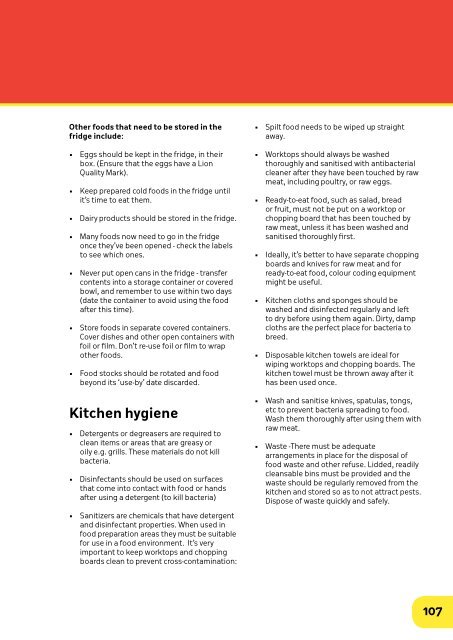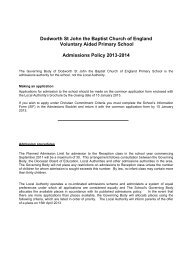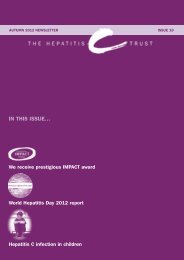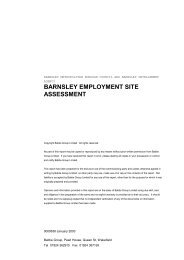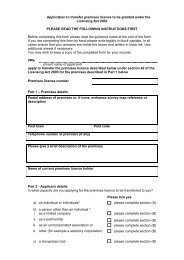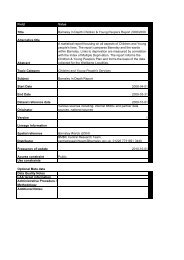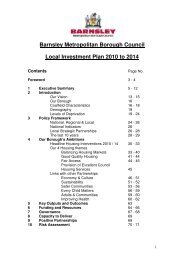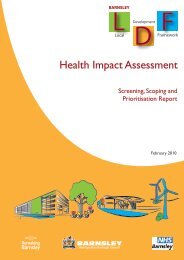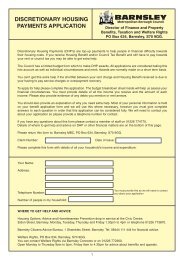Food and Nutrition Guidelines - Barnsley Council Online
Food and Nutrition Guidelines - Barnsley Council Online
Food and Nutrition Guidelines - Barnsley Council Online
You also want an ePaper? Increase the reach of your titles
YUMPU automatically turns print PDFs into web optimized ePapers that Google loves.
Other foods that need to be stored in the<br />
fridge include:<br />
• Eggs should be kept in the fridge, in their<br />
box. (Ensure that the eggs have a Lion<br />
Quality Mark).<br />
• Keep prepared cold foods in the fridge until<br />
it’s time to eat them.<br />
• Dairy products should be stored in the fridge.<br />
• Many foods now need to go in the fridge<br />
once they’ve been opened - check the labels<br />
to see which ones.<br />
• Never put open cans in the fridge - transfer<br />
contents into a storage container or covered<br />
bowl, <strong>and</strong> remember to use within two days<br />
(date the container to avoid using the food<br />
after this time).<br />
• Store foods in separate covered containers.<br />
Cover dishes <strong>and</strong> other open containers with<br />
foil or film. Don’t re-use foil or film to wrap<br />
other foods.<br />
• <strong>Food</strong> stocks should be rotated <strong>and</strong> food<br />
beyond its ‘use-by’ date discarded.<br />
Kitchen hygiene<br />
• Detergents or degreasers are required to<br />
clean items or areas that are greasy or<br />
oily e.g. grills. These materials do not kill<br />
bacteria.<br />
• Disinfectants should be used on surfaces<br />
that come into contact with food or h<strong>and</strong>s<br />
after using a detergent (to kill bacteria)<br />
• Sanitizers are chemicals that have detergent<br />
<strong>and</strong> disinfectant properties. When used in<br />
food preparation areas they must be suitable<br />
for use in a food environment. It’s very<br />
important to keep worktops <strong>and</strong> chopping<br />
boards clean to prevent cross-contamination:<br />
• Spilt food needs to be wiped up straight<br />
away.<br />
• Worktops should always be washed<br />
thoroughly <strong>and</strong> sanitised with antibacterial<br />
cleaner after they have been touched by raw<br />
meat, including poultry, or raw eggs.<br />
• Ready-to-eat food, such as salad, bread<br />
or fruit, must not be put on a worktop or<br />
chopping board that has been touched by<br />
raw meat, unless it has been washed <strong>and</strong><br />
sanitised thoroughly first.<br />
• Ideally, it’s better to have separate chopping<br />
boards <strong>and</strong> knives for raw meat <strong>and</strong> for<br />
ready-to-eat food, colour coding equipment<br />
might be useful.<br />
• Kitchen cloths <strong>and</strong> sponges should be<br />
washed <strong>and</strong> disinfected regularly <strong>and</strong> left<br />
to dry before using them again. Dirty, damp<br />
cloths are the perfect place for bacteria to<br />
breed.<br />
• Disposable kitchen towels are ideal for<br />
wiping worktops <strong>and</strong> chopping boards. The<br />
kitchen towel must be thrown away after it<br />
has been used once.<br />
• Wash <strong>and</strong> sanitise knives, spatulas, tongs,<br />
etc to prevent bacteria spreading to food.<br />
Wash them thoroughly after using them with<br />
raw meat.<br />
• Waste -There must be adequate<br />
arrangements in place for the disposal of<br />
food waste <strong>and</strong> other refuse. Lidded, readily<br />
cleansable bins must be provided <strong>and</strong> the<br />
waste should be regularly removed from the<br />
kitchen <strong>and</strong> stored so as to not attract pests.<br />
Dispose of waste quickly <strong>and</strong> safely.<br />
107


